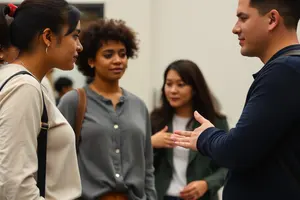Podcast
Questions and Answers
What is the primary goal of using the scientific method in psychological research?
What is the primary goal of using the scientific method in psychological research?
- To prove common-sense assumptions about behavior.
- To systematically acquire knowledge and understanding about behavior. (correct)
- To rely solely on personal insights and intuition.
- To eliminate the need for theories in understanding behavior.
How do theories primarily function within the scientific method?
How do theories primarily function within the scientific method?
- Theories are broad explanations that organize facts and principles. (correct)
- Theories are irrelevant to the research process.
- Theories are specific predictions that can be directly tested.
- Theories are used to prove cause-and-effect relationships.
What is the key distinction between a hypothesis and a theory?
What is the key distinction between a hypothesis and a theory?
- A theory is a specific testable prediction while a hypothesis is not.
- A hypothesis and a theory are essentially the same thing.
- A hypothesis is a testable prediction derived from a theory. (correct)
- A hypothesis is broader and more comprehensive than a theory.
Why is an operational definition essential when testing a hypothesis?
Why is an operational definition essential when testing a hypothesis?
In the context of psychological research, what is archival research?
In the context of psychological research, what is archival research?
What is a primary limitation of naturalistic observation?
What is a primary limitation of naturalistic observation?
What is a key requirement for conducting valid survey research?
What is a key requirement for conducting valid survey research?
Why might a researcher choose to conduct a case study?
Why might a researcher choose to conduct a case study?
If a researcher finds a strong positive correlation between exercise and mood, what can they conclude?
If a researcher finds a strong positive correlation between exercise and mood, what can they conclude?
What is the primary advantage of experimental research over correlational research?
What is the primary advantage of experimental research over correlational research?
In an experiment, what is the purpose of the experimental manipulation?
In an experiment, what is the purpose of the experimental manipulation?
In experimental research, what is the key difference between an experimental group and a control group?
In experimental research, what is the key difference between an experimental group and a control group?
What is the main reason for using a control group in an experiment?
What is the main reason for using a control group in an experiment?
In an experiment, what is the independent variable?
In an experiment, what is the independent variable?
In an experiment, what role does the dependent variable play?
In an experiment, what role does the dependent variable play?
What does 'random assignment to condition' accomplish in experimental design?
What does 'random assignment to condition' accomplish in experimental design?
How does using a confederate impact a research study?
How does using a confederate impact a research study?
How do researchers utilize statistical analysis toward the end of a research study?
How do researchers utilize statistical analysis toward the end of a research study?
When is it appropriate for researches to replicate already confirmed hypotheses?
When is it appropriate for researches to replicate already confirmed hypotheses?
Within psychological research, which of the following is a situational factor?
Within psychological research, which of the following is a situational factor?
Ethical guidelines in psychological research prioritize:
Ethical guidelines in psychological research prioritize:
What is the purpose of 'informed consent' in psychological research?
What is the purpose of 'informed consent' in psychological research?
What is the primary concern with using WEIRD participants in psychological research?
What is the primary concern with using WEIRD participants in psychological research?
What must researchers of animals ensure to protect the animals?
What must researchers of animals ensure to protect the animals?
In psychological research, what is experimental bias?
In psychological research, what is experimental bias?
Which of the following describes a placebo?
Which of the following describes a placebo?
What is the purpose of the double-blind procedure in experiments?
What is the purpose of the double-blind procedure in experiments?
Why should potential automobile buyers consider the logic by automobile manufacturers?
Why should potential automobile buyers consider the logic by automobile manufacturers?
Within the context of psychological research, a false treatment is known as:
Within the context of psychological research, a false treatment is known as:
Flashcards
What is the Scientific Method?
What is the Scientific Method?
The approach used by psychologists to systematically acquire knowledge and understanding about behavior.
What are Theories?
What are Theories?
Broad explanations and predictions concerning phenomena of interest.
What is a Hypothesis?
What is a Hypothesis?
A prediction stemming from a theory, stated in a way that allows it to be tested.
What is an Operational Definition?
What is an Operational Definition?
Signup and view all the flashcards
What are theories?
What are theories?
Signup and view all the flashcards
What is Archival Research?
What is Archival Research?
Signup and view all the flashcards
What is Naturalistic Observation?
What is Naturalistic Observation?
Signup and view all the flashcards
What is Survey Research?
What is Survey Research?
Signup and view all the flashcards
What is a Case Study?
What is a Case Study?
Signup and view all the flashcards
What are Variables?
What are Variables?
Signup and view all the flashcards
What is Correlational Research?
What is Correlational Research?
Signup and view all the flashcards
What is an Experiment?
What is an Experiment?
Signup and view all the flashcards
What is experimental manipulation?
What is experimental manipulation?
Signup and view all the flashcards
What is an experimental group?
What is an experimental group?
Signup and view all the flashcards
What is a Control Group?
What is a Control Group?
Signup and view all the flashcards
What is the Independent Variable?
What is the Independent Variable?
Signup and view all the flashcards
What is the Dependent Variable?
What is the Dependent Variable?
Signup and view all the flashcards
What is Random Assignment?
What is Random Assignment?
Signup and view all the flashcards
What is a Significant Outcome?
What is a Significant Outcome?
Signup and view all the flashcards
What is Replicated Research?
What is Replicated Research?
Signup and view all the flashcards
What is Informed Consent?
What is Informed Consent?
Signup and view all the flashcards
What is Experimental Bias?
What is Experimental Bias?
Signup and view all the flashcards
What is a Placebo?
What is a Placebo?
Signup and view all the flashcards
Study Notes
Introduction to Psychological Research
- A horrific incident involved Yue-Yue, a two-year-old, hit by a van in China, with 18 passersby failing to help.
- The event shocked and angered the public, it also emphasizes the complexity of bystander intervention.
- Kitty Genovese was attacked in the United States with 38 neighbors hearing the screams, yet no one came to her aid.
- Psychologists found fewer witnesses increase the chance of someone helping as it illustrates challenges for psychology to formulate useful questions and find valid answers.
The Scientific Method
- Scientists rely on it to pose questions and properly formulate answers
- It involves identifying questions, formulating explanations, carrying out research, and communicating the findings.
Theories
- These are broad explanations and predictions concerning phenomena of interest.
- Psychologists' theories are formal, focused, and based on careful study and knowledge.
- Diffusion of responsibility: the more bystanders present, the less personal responsibility felt to help.
Hypotheses
- A prediction is stated in a way that allows it to be tested
- This helps test the underlying soundness of the theories.
- They must be restated to allow testing usually involving creating an operational definition.
- Operational definition: translating a hypothesis into specific, testable procedures.
- Theories and hypotheses allow them to make sense of info by placing pieces in a coherent framework.
Research Methods
- Just like how there are different explanations, there's a multitude of research methods to conduct research
- Research is the systematic inquiry aimed at discovering new knowledge.
Archival Research
- This involves examining existing data like census documents, college records, and newspaper clippings to test hypotheses.
- Newspaper articles may be used to argue less helping behavior has been seen as bystander numbers go up
- Relatively inexpensive, this is because data is already collected.
- Data may not allow testing a hypothesis fully, can be incomplete or haphazardly collected.
Naturalistic Observation
- The investigator observes naturally occurring behavior without changing the situation.
- Involves recording events without intervention, offering insights into real-world behavior.
- Limitations exist in controlling factors of interest and potential for altered behavior if people know they're watched.
Survey Research
- Surveys ask a sample representing a larger population about their behaviors, thoughts, or attitudes.
- Survey methods are sophisticated, where even a small sample can infer a bigger result
- Potential challenges include non-representative samples, dishonesty, and lack of true self-awareness.
Case Study
- Case studies are in-depth investigations of individuals or small groups, often with psychological testing.
- A suicide bomber in the Middle East would encourage many psychologists to conduct a case study
- This helps improve people's understanding in general.
- The drawback is individual examination is unique, where valid generalizations for a larger population is impossible
Correlational Research
- variables can change or variety, in some way including behaviors, events, or other characteristics such as study time
- Designed to determine whether two variables happen together
- Two variables are assessed to see if they are associated, or "correlated."
- Positive Correlation implies that values of both go up and down together ie amount of study relates to test score
- Negative Correlation suggests opposite, less hours of partying and more study time, inversely related
- Correlation can range between +1.0 and -1.0
- It finds how strong the relationship was between partying and studying in general terms
Lack of Relationship
- This simply means there is no discernible connection between two variables.
- Correlation does not equal causation; correlation suggests predictability, not cause and effect.
- A study of violence in the media does not definitively state what occurs because of its relation
Experimental Research
- Cause-and-effect relationships are found
- Experiment: changing an aspect of one variable in controlled conditions to see its effect on other aspects
- Conditions are created and controlled to observe the change
- Experimental manipulation: researcher’s deliberate change in an experiment.
Groups
- The manipulated groups are either with treatment vs no treatment
- Experimental group: the one that receives the treatment
- Control group: the one that gets no treatment
- This helps eliminate other stuff that may happen
- Researcher's hair color
- Temperature during experiment
Bystander Experiment
- Independent variable: the one manipulated by experimenter
- Dependent variable: the one measured as a result
-
- Random assignment*: assigning participants so their characteristics will distribute evenly into groups
Ethical Issues
- They also cannot just see what may affect people's behavior, as it could be an outright lie
-
- Latané and Darley* tested things under a seizure simulation experiment to assess what people may do
- Informed consent: basic outlines of the study, as well as their right to withdrawal
Participants
- Students were readily signed up
- Non-typical in general human terms
- Psychological wellness tests and measures
What Makes A Hero?
- Dispositional Factors do play a role in when dealing with help
- When Laurie Ann Eldridge knew what to do it did depend on situational factors
- Personal characteristics in emergency situations
Studying That Suits You
Use AI to generate personalized quizzes and flashcards to suit your learning preferences.




